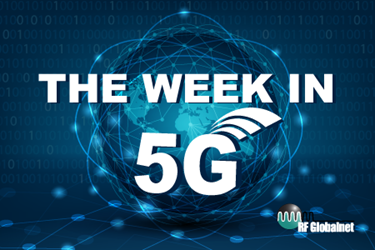The Week in 5G: 3/31/2020 — Despite Some Delays, Global 5G Juggernaut Advances During Pandemic
By Ed Biller

Spain will delay its planned auction of 700 MHz band spectrum for 5G use due to the coronavirus outbreak, the nation’s government announced Monday.
Spain has been among the countries hit hardest by the virus, and plans to set a new deadline for the 700 MHz band auction based on when health emergency measures are scaled back enough to allow the event to occur, reports Reuters.
Austria and France also have delayed planned spectrum auctions.
Additionally, the 3GPP committees working on 5G-related communication standards have implemented a three-month to freezing the Release 16 and 17 specifications, as well as canceled face-to-face plenary meetings through June, reports Chantal Polsonetti, writing on behalf of Arc Advisory Group.
“The delays move the Release 16 Stage 3 freeze date back to June 2020, with the freezes on the Release 16 ASN.1 and OpenAPI specifications remaining in place for June 2020. The freeze date for Release 17 Stage 3 now stands at September 2021, with the associated ASN.1 and OpenAPI specification freeze set for December 2021,” Polsonetti wrote.
Still, rollouts, research, and device announcements continue to roll out, adapting to new realities.
Total Telecom reports, based on data from the Global Mobile Suppliers Association (GSA), that 70 operators have now launched commercial 5G in 40 countries.
“Of these, 63 had launched 3GPP-compliant mobile services (57 full launches, 6 limited availability launches), and 34 had launched similarly compliant fixed wireless access (FWA) or home broadband (27 full launches, 7 limited availability launches),” the report adds, noting that the GSA database contains 381 operators “currently investing in 5G tech” across 123 countries.
Competing telcos Hutchison Telecom HK and HKT both plan to start 5G service in Hong Kong this week, writes Light Reading contributor Robert Clark, working around obstacles set by the pandemic
According to Clark, Hutchison CEO Kenny Koo said the coronavirus outbreak had not “altered the ‘investment or pacing’ of the operator's 5G deployment, but had introduced some unexpected factors.”
Among those factors were supply chain complications and limited access to Hong Kong government premises (where cell sites are to be located), the latter attributed partly to many civil servants working from home.
In Japan, Fujitsu Fujitsu has switched on what it claims is the nations’s first commercial private 5G network at its Shin-Kawasaki Technology Square office in Kawasaki City, Kanagawa prefecture, reports Computer Weekly.
Per the report, “Fujitsu was the first company in Japan to obtain a private 5G radio station provisional licence from the Kanto Bureau of Telecommunications… it has spent its time verifying the registration and connectivity of base stations and land mobile stations (data communication terminals), as well as coverage area, in accordance with Japan’s Radio Law, in order to obtain a full commercial licence.”
In Russia, Telit and carrier Mobile TeleSystems’ (MTS) collaborated to achieve that nation’s first successful 5G Sub-6 GHz 5G connection. The partners used MTS’ 4.9 GHz (sub-6 GHz) network.
Per Digital Signage Connection, MTS is Russia’s largest mobile operator, and “launched the country’s first continuously operable mid-band 5G pilot zones in Moscow and St. Petersburg. Both zones also use mmWave and 4.9 GHz spectrum.”
In the United States, the Department of Defense (DoD) has released the third of four planned Request for Prototype Proposals (RPP) relating to 5G technology development.
According to a report by MeriTalk, the “RPP called for industry input into technology development related to Augmented Reality/Virtual Reality testbeds, networks, and applications at Joint Base Lewis-McChord in Washington state.”
Per the MeriTalk report, DoD last week issued two 5G “Smart Warehouse RPPs” (Marine Corps Logistics Base in Albany, Georgia and Naval Base San Diego), and plans to issue a fourth The fourth RPP relating to dynamic spectrum sharing (DSS).
Also in the U.S., the President Donald J. Trump recently signed the "Secure 5G and Beyond Act of 2020,” whose impressive name doesn’t hide much substance, according to a report by Screen Rant.
“While the Act establishes the need for a unified approach to securing 5G technologies and infrastructure, it doesn't actually offer any specific, protective measures,” the report states. “Rather, it lays out a series of broad mandates the Trump White House must take into consideration when drafting its security plan, and requires a draft of that plan to be delivered to Congress within 180 days.”
